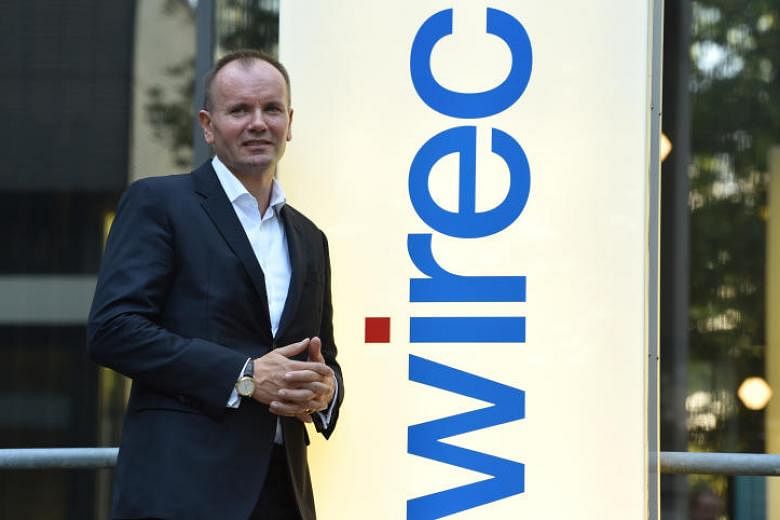NEW YORK (BLOOMBERG) - In his 17 years as chief executive officer of Germany's Wirecard AG, Markus Braun has gained plenty of experience fighting off sceptics and critics.
But the stakes have never been this high, for Mr Braun has taken this complex financial-plumbing operation with roots in pornography and online gaming into the most exclusive preserve of German business: the 30-company DAX stock index. His company's €16 billion (S$24.65 billion) market value about matches Deutsche Bank's; Braun's 7 per cent stake makes him a billionaire.
Which is why it was just a matter of time before the accusations of cooking the books and fraud reemerged. The 49-year-old Austrian computer scientist has spent more than a decade fighting off critics whose whispering campaign burst into the headlines again last week. A Financial Times report of suspect transactions in Asia sent the company's shares plummeting.
Braun quickly fired back, accusing detractors of spreading false and slanderous information. He'd previously said he sees the attacks as a chance to strengthen the company.
"Whenever you stick your head out, some people will like it and some won't," he said in a September interview at Wirecard's headquarters outside Munich.
"That's a good thing in an open and pluralistic society and it's also expressed in capital markets. It can make you stronger and more robust if you focus on the positive and manage to make something positive from negative energy. We are permanently improving our reporting and take up suggestions by investors."
SHORT SELLERS
German regulators have gone after short sellers - speculators who bet on shares' declines - in the past for allegedly seeking to manipulate the stock.
Following the latest news, the regulator is again looking for signs of possible market manipulation, and Munich prosecutors are reviewing the facts to decide whether to open a probe. The authorities in Singapore are also looking into the matter.
The probe of potential market manipulation has yet to conclude, a spokesman for the German watchdog, Bafin, said in an e-mailed response to questions.
Centre stage is not where Braun is comfortable, he says. Based in a suburban office park a world away from the glittering urban towers that house most financial powerhouses, he calls himself shy. That has left open questions about the company's stunning growth the past two years.
"Wirecard were quick to try to get ahead of this, but it's still hard for them to put it to bed," said Markus Friebel, an analyst at Independent Research in Frankfurt who recommends investors sell Wirecard shares.
"If this was an attack, then it fell on fertile ground. The company's business model is very complex and it has a lot subsidiaries. But I don't see that changing any time soon, so you can't rule out that they will be attacked again."
STRATEGY
At the heart of Wirecard's strategy is the notion that cash is obsolete and that technology is driving huge growth in payment volumes at ever-lower cost.
The firm serves as a middleman for consumers, merchants and banks, providing software and systems for online payments and fraud protection. It has ridden a wave of investor enthusiasm for payments firms seen to be at the cutting edge of financial technology.
Revenue about doubled since 2016 to €2.1 billion last year following the acquisition of at least 18 companies for more than €1 billion in recent years.
Financial metrics, though, are no longer the most pressing issue for many Wirecard investors.
A Jan 30 Financial Times report described allegedly fraudulent flows of money overseen by an executive in the Asia-Pacific region. A subsequent FT report detailed how a law firm found evidence indicating Wirecard had committed serious offenses in several jurisdictions.
Wirecard rebuked both stories, calling them "inaccurate, misleading and defamatory". Braun hit the phones to reassure shareholders. It was clear that he couldn't speak to them all one-on-one, so the company held a conference call with analysts and investors on Monday (Feb 4) to spell out its handling of the allegations.
TRANSPARENCY
"I think companies don't normally give insight into such compliance processes," Braun said on the call, where he was quizzed by 11 analysts, more than he usually faces on the company's quarterly earnings reports.
"Even though we don't see it in any way as material, we think it is our, let's say, obligation to be fully transparent and give this confidence to the market."
A Wirecard employee in Singapore alleged in April that a member of the company's finance team engaged in potential accounting breaches, he said.
"There were personal animosities between employees involved," said Braun. "We think the whole issue is not so much an accounting, compliance or whatever issue, but an issue between people. Such things happen, where there are human beings, there are sometimes emotions."
The alleged breaches took place between 2015 and 2018 and relate to revenue totaling €6.9 million, costs of €4.1 million and intellectual property valued at €2.6 million, according to the company.
While Wirecard is still waiting on the final report of a law firm it asked to investigate the matter alongside its own probe, "we consider the whole issue as resolved, so we do not expect any material findings here", Braun said.
Founded in 1999, Wirecard initially provided financial services to online gambling and adult websites but nearly foundered following the collapse of the tech bubble.
Braun was named CEO in 2002 and said he put as much as €75 million of his own funds into the firm - money he'd made on successful bets on tech companies, according to an interview with Manager Magazin.
Unlike North American tech billionaires, he usually sports a suit instead of a hoodie, but no tie. He enjoys few extravagances other than skiing and the opera, according to the interview with Manager Magazin.
Braun received a degree in computer science from the Technical University of Vienna and a doctorate in social and economic sciences, according to his LinkedIn profile. He worked as a management consultant before he was recruited to Wirecard.
"A lot of people studied law or business, but I consciously went for technology along with business. I was interested in both," he said in the September interview. "Our ability to invent things is the best side of human beings."
While Braun says the FT report hasn't hurt the company's business, not everyone's convinced.
"There is so much hype around Wirecard and they are so highly valued that it doesn't take much to cause the shares to tumble," said Friebel. "The question is just how sustainable that erosion of trust that we saw last week will be."








